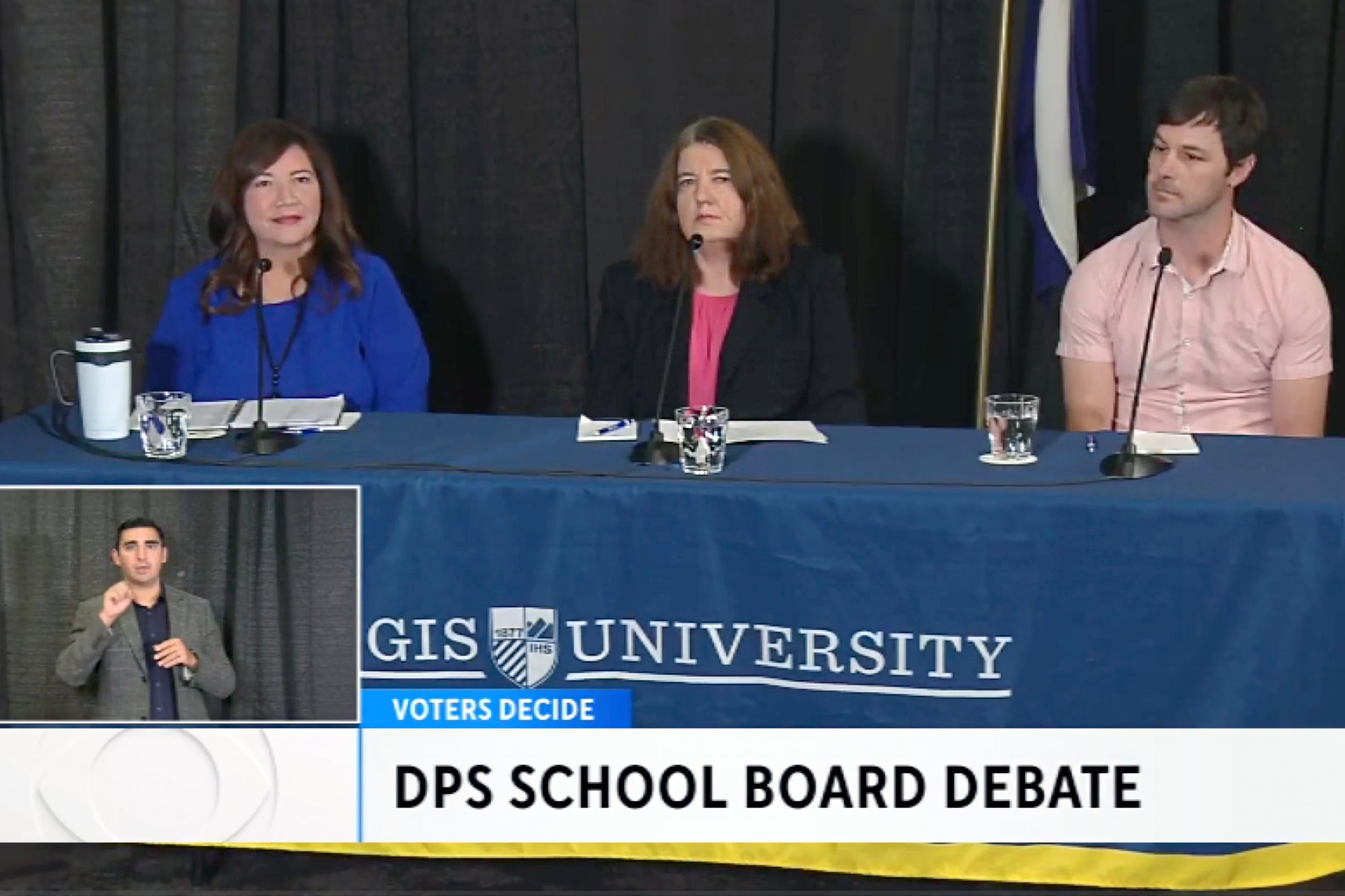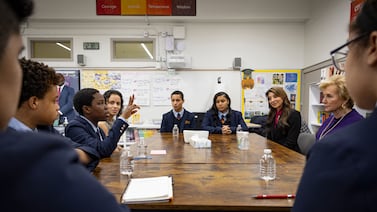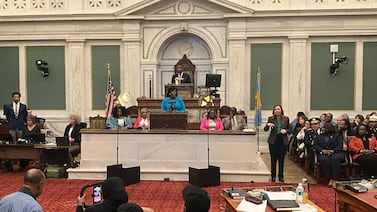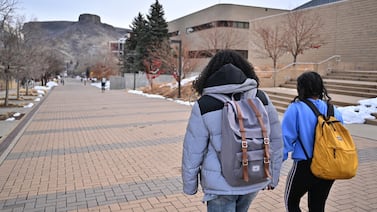Sign up for Chalkbeat Colorado’s free daily newsletter to keep up with education news in Denver and around the state.
Asked to name a decision by Denver school board member Charmaine Lindsay that they disagreed with, the two candidates challenging Lindsay for her seat pointed to different votes.
Marlene De La Rosa said she opposed Lindsay’s vote to close Fairview Elementary due to low enrollment. And Adam Slutzker said he disagreed with her vote to return police officers known as school resource officers, or SROs, to some Denver schools.
Lindsay defended her vote on SROs, arguing that the officers deter crime and build trusting relationships with students who may be experiencing violence themselves. She said her Fairview closure vote was based on data that showed the small school wouldn’t have enough students to fill a kindergarten classroom this fall.
Those were among the key exchanges at a recent debate between the three candidates at Regis University co-sponsored by Chalkbeat Colorado, CBS Colorado, Regis, and Educate Denver.
Lindsay, a family law attorney with grandchildren in Denver Public Schools, was appointed by the board last year to fill the seat representing northwest Denver’s District 5 and is now running in the Nov. 7 election to keep it. Challenger De La Rosa is a longtime DPS volunteer and advocate. Slutzker is a former teacher and father of three DPS students.
Three of the seven Denver school board seats are up for grabs Nov. 7. The election has the potential to shift the dynamics of the board, which has been criticized for infighting. It will also shape the district’s approach to school safety, declining enrollment, and other challenges.
Below, read some of what Lindsay, De La Rosa, and Slutzker had to say at the debate, and watch the full 30-minute video. The candidates’ responses have been edited for length and clarity.
For Marlene and Adam, is there any decision that Charmaine has made as a sitting board member that you disagree with? And for Charmaine, is there a position of Marlene’s or Adam’s that you’ve heard throughout the campaign that you disagree with?
Slutzker: I would say reinstituting SROs. I don’t personally believe that SROs make our schools a safer place. I am willing to be convinced otherwise via data, but I have not seen any data to the contrary. I think the unfortunate reality is if somebody wants to harm our children in our schools in America, they are going to be able to harm our children in our schools.
Lindsay: I disagree with that, obviously, about the SROs. There’s a lot of benefits to SROs, including being somebody that is a confident and trusted person in the school for children that are … experiencing violence themselves. There’s also evidence that there’s a deterrent.
Even then, it’s looking at each individual school. We have 200 schools, approximately, in DPS. We have [SROs] in 13 because those schools decided that they wanted them and all we did was say, ‘We’re not going to be the people that decide. We’re going to leave it up to you.’
De La Rosa: I disagree with the vote to close Fairview Elementary. The process was not really engaging with the community. I think that the district did not spend sufficient enough time working with that community and preparing them, looking at the data, the projected enrollment, working with the Denver Housing Authority. That affected one of our most disadvantaged populations in our city, and I think that they suffered very tremendously in that decision.
Lindsay: Can I use my rebuttal for that? I think that one of the things that went into that decision was the numbers — the numbers that actually were, not the numbers that are going to be. And I’m really optimistic that those numbers are going to increase and we’re going to be able to reopen Fairview. But at the time being, we did not have enough kids to open a kindergarten class in that school. We really need to re-envision that school when people are actually living in the neighborhood and not based on [the] future.
The school board has been criticized as dysfunctional, and polls have shown low confidence in its ability to govern. What changes would you propose to how the board does business?
Lindsay: The board’s reputation and the board’s image has suffered because of a lack of collegiality and a lack of professionalism. Since I’ve been on the board in the last 15 months, I have worked really hard to improve on that. I have not been part of the drama or the theatrics of the board. I’ve been working behind the scenes to do what’s in the best interests of the kids of DPS and the teachers of DPS. As a board, there are several of us that are coming from that position, and we’re getting highlighted a lot by other people that are out there creating a chaotic atmosphere that isn’t necessarily what we’re actually accomplishing on the board.
De La Rosa: First and foremost, we need to remember why we’re there and that’s student outcomes. But I do want to point out one thing: When you sit in a space where things you know are not going the way they should, and you don’t speak up and acknowledge that, you are also part of that dysfunction. And so I definitely want to focus on working with my fellow board members on how we can understand each other’s goals and priorities, and how we can work best towards that bottom line, which is the student outcomes.
Slutzker: I don’t think it’s so much with how the board does business. It’s just trying to assume best intent. Ideally, everybody that shows up in a board meeting, whether that’s board members or the public coming to speak, is there because they genuinely care about student outcomes and family outcomes, and want to do the right thing by our student population.
I consider myself a practical problem solver. I consider myself a great listener who’s always willing to listen and learn. And I think most of the board wants to see that happen as well. I think everybody on the board will tell you they would happily be out of the news cycle. What we do is vitally important, but it should not be full of sound bites.
Denver gained national attention for its “family of schools,” which includes traditional district-run schools, semi-autonomous innovation schools, and independent public charter schools. The current board has been less inclined to champion charters, and has limited innovation. What is your opinion on strengthening traditional schools versus reimagining them as innovation or charter schools?
De La Rosa: We need to focus on strengthening each and every one of our schools. I believe in that portfolio of schools — that we have different models for different parents, different students. They each have their own learning needs and focusing on that and how we can strengthen all of those. And having transparency and accountability too, so that parents can accurately make a choice in where they want to send their kids to school.
My own son went to three different high schools. We had to work through that as a family. And as for him, I had to evaluate what his needs were and choosing the right school environment for him, whether it was a charter or a traditional or an innovation [school].
Lindsay: One of the things we need to do is when a school has a really popular program, and that’s why a lot of people want to go across town or choice into that school, we need to take that program and try to put it in a local place so that people don’t have to travel across town.
With declining enrollment, it’s been very difficult for any charter schools to get off the ground because there just isn’t the numbers of students that are out there to really fill the schools.
The secret to fixing the problem on this is to have smaller class sizes, which also supports teachers, and to try to make the neighborhood schools more attractive.
Slutzker: Our school choice system is broken. It is absolutely used more by affluent families across the district who opt their kids into a school of choice.
I am a former educator. I spent time in a lot of these different learning environments: expeditionary learning schools, IB schools, arts integration schools. We absolutely should be offering a variety of learning environments, but we need to do it in a thoughtful way.
We’ve opened almost 80 new charters, I believe, in the last decade, while we’ve been facing declining enrollment. There’s a reason that we’re having to talk about school consolidations. [Fact check: Between 2001-02 and 2021-22, Denver opened 72 new charter schools.]
And we need to evaluate the current charter schools we have operating [to] make sure they’re living up to the expectations and the agreements that they’re putting forth as far as providing viable learning outcomes for their students,
De La Rosa: I want to use my rebuttal. According to the choice data in DPS, 45% of the students and families that use choice are from families of color.
Slutzker: I do not want to get rid of school choice. I want to be very clear about that. What I would like to do is reimagine our school of choice so that we give first round of open enrollment to students of lower income and students with documented social, emotional, or educational needs, so that they can have the first option to get to the school of choice before affluent families are making those decisions.
Watch the entire debate below or see it here.
Melanie Asmar is a senior reporter for Chalkbeat Colorado, covering Denver Public Schools. Contact Melanie at masmar@chalkbeat.org.







